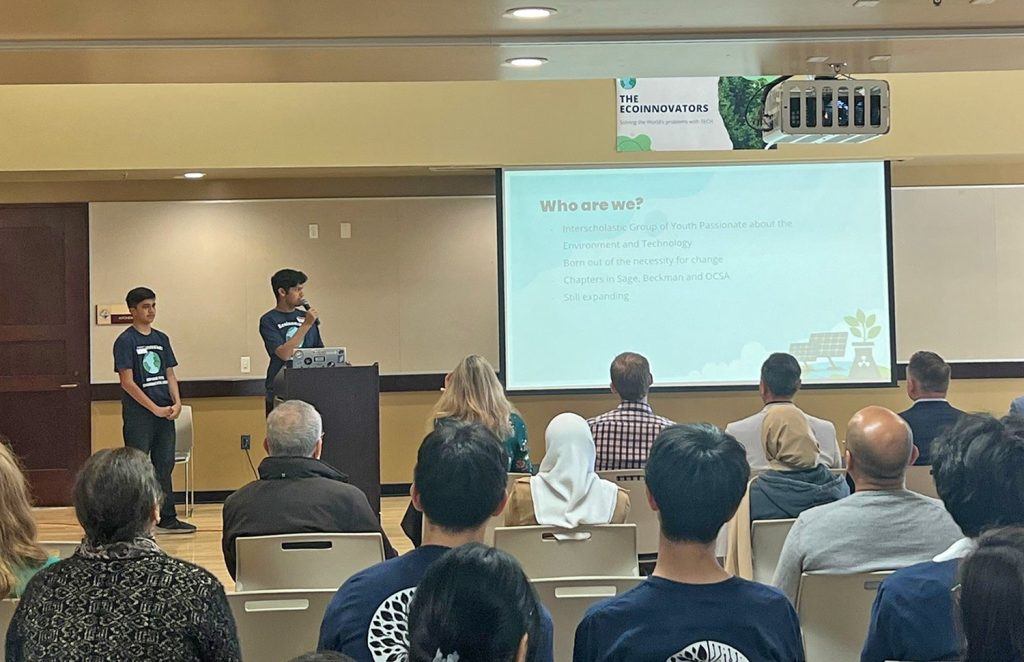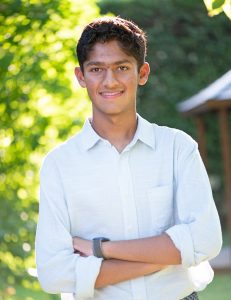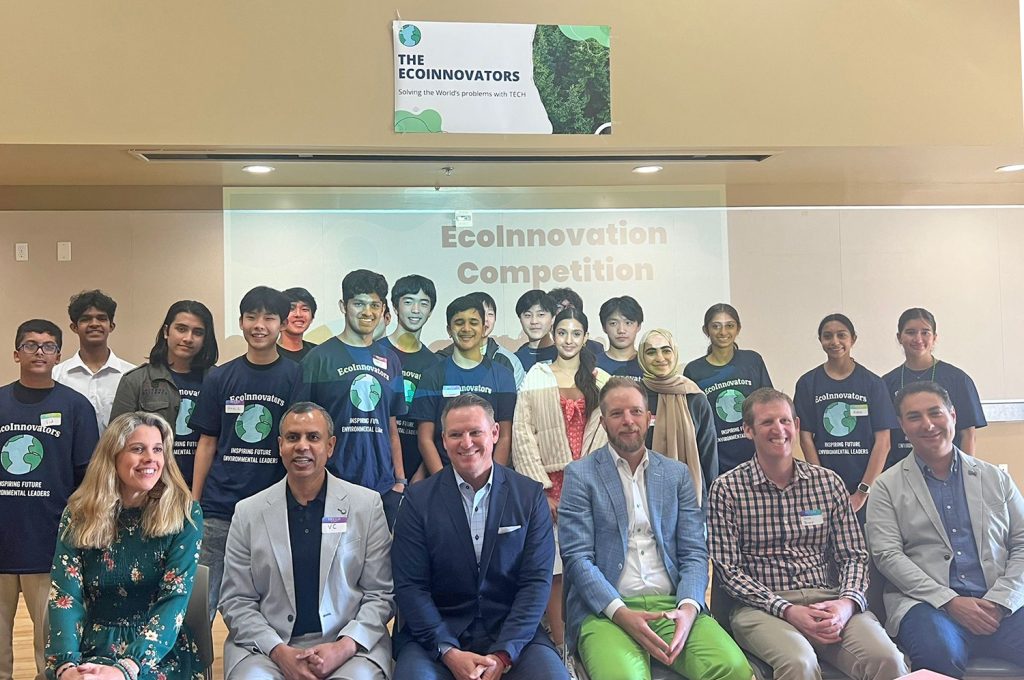
By Miki Akil | Special to the NB Indy
Small changes can make a big impact.
Shaurya Mittal, 15, a sophomore at Sage Hill School, kept that in mind when he founded Eco Innovators, a club on the Newport Beach campus that focuses on environmental issues, sustainability, and green technology.
He started the group in the summer of 2023. It has since grown to about 25 students at Sage, and spread with club chapters at three other Orange County high schools (with more interested).
Club members are coming up with innovative ideas to tackle environmental issues, including hosting their inaugural sustainability competition last month, when eight projects were presented to a notable expert panel and a sizable audience.
Promoting the event, Eco Innovators highlighted that “the solutions of tomorrow start with the innovation of today,” an idea that’s at the heart of the club’s mission.
Since a young age, Mittal has been interested in environmental topics and sustainability focused projects.
“It’s been an issue that I’ve really cared about for a long time,” Mittal said.
The club came from his aspiration to get more people involved in something that could potentially make meaningful change. A lot of people are interested, but they don’t know how to apply that interest, he said.
“People have so many good ideas, I want to give them a space for them to be able to display those ideas,” Mittal said. “That’s what led me to create Eco Innovators.”

Throughout the year, the club hosts environmental lessons, including guest speakers and presentations from chapter leaders or members. They cover a variety of topics (for example, battery alternatives or vertical farming) and most focus on innovations in technology and how that can apply to environmental issues.
“The reason we do that is to inspire people and to give ideas to people,” Mittal said.
Going forward, Mittal hopes more schools will get involved and bring the club to their own campus.
“There are so many bright students no matter which schools you go to and having more people involved would allow us to push the limits of what we can think of and think of even more interesting and innovative ideas in the future,” he said.
Branching out with additional chapters during Eco Innovators’ inaugural year was a challenge, Mittal commented, but he found others that shared his interest in the environment and technology.
He first reached out to his longtime friend, Aryan Sharma, 15, a freshman at Orange County School of the Arts. At OCSA, Sharma was able to use his own strategies while also collaborating with Mittal on discussion topics, competition format, and how to encourage engagement.
“We’re both very interested in technology and science,” Sharma said, which is why he was inclined to get on board with the Eco Innovators club.
Although it had a bit of a slow start, the OCSA chapter now has around 60 members, and more than half are regularly active with the group. In the fall semester, they focused on discussing green tech and talking about potential solutions to different environmental problems.
In one session, the group investigated alternatives to lithium-ion batteries, Sharma said, and deliberated over which source would be the best in terms of usability, expense, and other factors. The comments were well thought-out, he added.

The idea of hosting an event where students could essentially pitch their environmental/science and tech business proposals also stood out to him, Sharma added,
“(It’s) empowering the youth with being able to innovate and bring out their own ideas to the world,” he said.
A lot of clubs either prepare students for knowledge-based competitions or teach information, both of which are great, Sharma noted, but Eco Innovators is unique in that it asks the students to do both critical and creative thinking in developing their own ideas, and it encourages problem-solving. It also helps guide them in actually creating something which can be presented to industry experts.
In the spring, the group kicked it into high gear to prepare for the conference. Sharma helped the club members learn how to identify a problem and work out solutions using engineering and scientific methods.
“I wanted them to think of their products or their solution as part of that scientific process of creating an idea, engineering a solution, testing it out, refining it, testing it (again),” Sharma said.
All the club’s work culminated with the competition in March, when club members were given the opportunity to present their own ideas in front of an expert panel. Mittal and Sharma recruited the judges (and organized the event, so neither participated in the competition) from both the environmental and technology fields: Water Conservation Coordinator Shane Burckle with the city of Newport Beach; Tim Springer, CEO of Level Access, a company that offers digital accessibility solutions; Isabelle Bart, part of Small Business Development Center at University of California, Riverside, which provides individualized support to early-stage tech entrepreneurs and small businesses; Professor Vidyanand (VC) Choudhary from UC, Irvine, who is an expert in information systems and technology; Omid Aslani, founder of Organ Finder, a global, tech-based organ-matching platform; and Jelle Brons, an executive vice president in PIMCO’s Newport Beach office, specializing in global and U.S. investment and sustainable investing.
At the competition, a total of eight projects were presented. The ideas presented at the competition ranged from tools individuals can incorporate in their own home to concepts that tack wider scale issues.
“All the projects were very good and well thought out,” Sharma said.
One Eco student presented a new design for a watering mechanism for indoor plants. It used sensors to identify the most effective times for watering to minimize the amount of water used, while keeping plants healthy.
Another pitched an idea for making farms more cost effective, space effective, and reduce the amount of water they consume through vertical farming. While vertical farming isn’t a new idea, the student shared specific implementation plans for the local area, Mittal explained.
Additionally, one notable idea highlighted was an app that tracked microplastics in aquatic plants. The student who worked on the proposal researched and experimented with how microplastics affect plants for several weeks before developing the app, Sharma noted.
There were two top ideas that came out of the competition, Mittal said.
Go Wild, created by a Sage sophomore, is an idea for an app that would take photos of the user’s surroundings and award points for exploring the wilderness and finding plants and animals.
“The goal was to get younger kids more into nature and less stuck inside,” Mittal said.
Tied for first place, the other top winner tackled the fast fashion industry. It’s an idea for an app that helps the user understand the carbon impact of their shopping habits, especially related to fashion. The student spoke about data from top shopping and clothing companies that are engaged in “fast fashion,” which focuses on mass-producing clothing and quickly getting the garments to retail stores in response to current trends when demand for those styles is at its highest. The business model encourages shoppers, including high school aged youth, to make purchases again and again, Mittal noted, which can lead to a lot of carbon waste.
“The idea that she pitched not only showed the amount of carbon and the impact (of it), but also encouraged people to buy from different retailers that have products that were meant for longer lasting (use) rather than rapid re-consumption of the same clothing items,” Mittal said.
While the winning teams were awarded cash prizes (between $50 and $200 provided by nonprofit Sustain With Change, a family-run organization that recently launched), the key takeaway for many of the participating students was what they learned from the process of developing their idea and the feedback they received from industry professionals. They also improved their critical thinking and problem-solving skills, Mittal noted.
“These skills are translatable into helping the world in a lot of different ways,” Mittal said.
Both Mittal and Sharma agreed that the event was a success. There were a lot of people in the audience and a good group of presentations.
“I think it turned out really well and I’m really happy at how it came out, especially given it’s just our first year of doing it,” Mittal said.
Both Mittal and Sharma have been interested in science and technology for many years.
Mittal became more invested in combining environmental issues and technology during the COVID-19 pandemic when he noticed a number of neighborhood trash cans were filling up with plastic waste faster than before due to so many people ordering takeout food.
After researching the issue, he decided to develop an app to help.
After a lot of late nights learning what to do through YouTube tutorials and his own trial and error, Mittal created an app, EcoTakeOut, that allows the user to find out which restaurants have better waste practices and how to dispose of different containers.
The first iteration of his idea headed to his local science fair, which did well but needed some fine-tuning. He redesigned the app and ultimately submitted it to the 2022 Congressional App Challenge. The winners are invited out to Congress to present their idea. Mittal’s app ultimately won for California’s 47th District.
The process was long, but sparked his interest and encouraged him to continue addressing important environmental topics through technology.
“It was definitely an aha moment for me,” Mittal said. “I realized it was something that I really cared about a lot.”
Sharma started getting into science (specifically environmental science and physics) in middle school and joined the Science Olympiad team. A number of his science fair projects were geared towards applying his knowledge of physics to the environment. He was inspired by a variety of sources, including former NASA engineer and science-focused YouTuber Mark Rober and the Boy Scouts, which instilled a respect for nature and sustainability.
He started enjoying the research process through science fairs, and his love of science has evolved over the years. Now, Sharma is headed to the global level at the upcoming International Science and Engineering Fair (his project studies using artificial lights to grow plants).
Overall, both Mittal and Sharma feel the club is preparing students to take action outside of the group on environmental issues.
“I feel very hopeful that everyone in Eco Innovators is making some kind of change, no matter how small. I think it is creating an impact and I see that when students in my club are asking deep questions about environmental science, or technology, or any form of science,” Sharma said. “I would say that we are making a big change … we’re still encouraging a new mindset, at least, that’s about problem solving and innovative solutions.”
They’re providing a different opportunity that hasn’t been tapped into, where students are actively creating solutions to problems and pitching them, he said.
Regarding broader environmental concerns, there needs to be a lot of change, Mittal commented, but small, individual actions, like using the EcoTakeOut app or being more efficient about watering plants at home, can create a ripple effect and ultimately lead to wide-scale difference.
“Every single person trying to have better habits really adds up,” Mittal said. “My vision … is just for people to make the effort and understand that smaller actions still can have that kind of impact, even if they aren’t necessarily seeing it first-hand.”
This outlook is shared by his mother, Shveta, who helps run an organization called Sustain With Change, whose mission is focused on highlighting the fact that the little things people do in their everyday life can still make a big impact.
They focus on education with work like EcoTalks, where they interview experts and activists who are making a difference in their community and beyond, and EcoEats, which helps restaurants make the switch to environmentally friendly packaging.
Students interested in joining or creating a club, or people who would like to attend next year’s event, can reach out and follow the group through social media at www.instagram.com/shsecoinnovators.
Learn more about the nonprofit at www.sustainwithchange.org.




